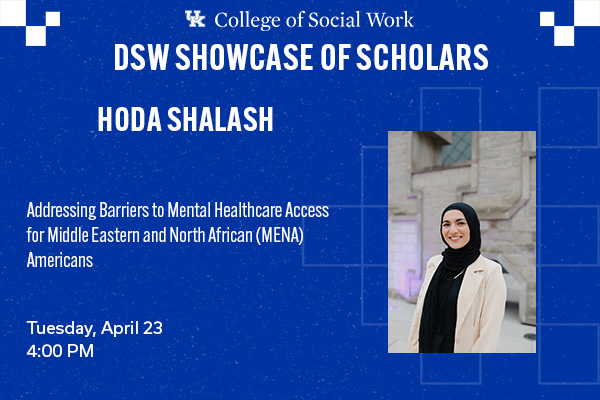DSW Candidate – Hoda Shalash, MSW, CSW, 4:00 PM – 5:15 PM
$0.00
Virtual Showcase of DSW Scholars 2024 Event!
Addressing Barriers to Mental Healthcare Access for Middle Eastern and North African (MENA) Americans
DSW Candidate – Hoda Shalash, MSW, CSW
Tuesday, April 23, 2024
4:00 PM – 5:15 PM Eastern Time Zone
Credit Hours: 1.0
Description
Addressing Barriers to Mental Healthcare Access for Middle Eastern and North African (MENA) Americans
Middle Eastern and North African (MENA) American individuals and communities often face barriers to accessing mental health services due to factors such as stigma and lack of resources to meet their diverse needs. Three scholarly products were written to address these barriers. A systematic literature review was conducted to collect evidence from the literature regarding the relationship between MENA communities and stigma related to mental healthcare.
The identified factors contributing to barriers of accessing mental healthcare include the stigmatization of care, discrimination, and barriers that contribute to the access of mental healthcare treatment. A conceptual paper explored how increasing cultural competence in clinicians plays a crucial role in reducing mental healthcare barriers in MENA American communities. This includes increasing trust and rapport, addressing stigmas, culturally tailoring interventions, and actively engaging in collaboration with community resources.
Product three is a practice application paper that explores how bridging the gap between local leaders and mental health professionals could effectively decrease stigma, increase mental health literacy, and encourage individuals to seek professional help
Learning Objectives:
- Gain a clear understanding of barriers that MENA Americans face in accessing mental healthcare, including the gaps in literature that is available to address this issue.
- Identify strategies that aim to increase cultural competence among clinicians to effectively meet the needs of MENA Americans and other minorities.
- Describe the role that community and religious leaders can play in increasing access to mental healthcare and meeting the mental health needs in an effective way.
Delivery Method: Live Interactive Training via Zoom Video Conferencing
Credit Hours: 1.0 (ACE)
Target Audience: This conference is intended for social workers and students.
Accreditation: University of Kentucky College of Social Work, Provider # 1377, is approved as an ACE provider to offer social work continuing education by the Association of Social Work Boards (ASWB) Approved Continuing Education (ACE) program. Regulatory boards are the final authority on courses accepted for continuing education credit. ACE provider approval period: 9/29/22-9/29/25. Social workers participating in this conference will receive up to 15 general continuing education credits.
Claiming CE Credit: Instructions for claiming CE credit will be disseminated at the beginning of each session.
Questions: If you have any questions regarding CE credit or to report a grievance, please contact Melissa Whitaker at melissa.whitaker@uky.edu. For technical assistance, please contact lmshelp@uky.edu.
